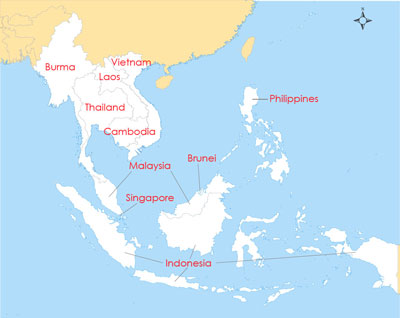




U.S. officials are not saying it directly but President Barack Obama's first overseas trip following his re-election to Southeast Asia appears intended to blunt China's growing clout in the region.
Obama will leave Washington on Saturday for a visit to Thailand followed by a landmark visit to once-pariah Burma before winding down his four-day regional trip by attending the 18-nation East Asia Summit in Cambodia.
"The three countries that he will visit—in some ways, they’re sort of the three troubled children of the pivot," said Michael Green, former Asia chief at the White House, referring to the Obama administration's one-year old "pivot to Asia" strategy seen by analysts as a U.S. bid to clip China's growing military and economic influence in the region.
"Each [of the three countries] has a complicated relationship with the U.S. and with China," observed Green, now with the Center for Strategic and International Studies (CSIS) in Washington.
Thailand, despite being the oldest U.S. ally in Asia, has moved closer to China in recent years.
The change became rapid especially after a military coup against the democratically elected Thai government in 2006 forced the U.S. to review its defense relations and suspend aid to the Southeast Asian nation for more than a year.
A U.S. poll three years after the coup showed that—aside from China—the elites in Asia who saw the U.S. as the biggest threat were in Thailand.
Ambivalence
In a reflection of the continuing ambivalence Thais have about being too close to the U.S., the Thai government recently refused to allow the U.S. space agency NASA to use the U-Tapao naval air base southeast of Bangkok for atmospheric research study.
Thailand was concerned the U.S. may want to use it as a military base for the pivot to Asia. It was also dismayed by apparent U.S. reluctance to shift attention to nonsecurity issues, such as food and energy security and environmental protection, in developing ties with Thailand.
"From the Thai perspective, the U.S. has only responded [to] those interests that fit with the U.S. security requirement," wrote Kavi Chongkittavorn, a Thai columnist and editor at The Nation newspaper.
"Thailand has often complied with U.S. requests for uses of air bases and other covert cooperation that served the latter's strategic interests. In comparison, China fares much better in this area with quite a positive image as far as reciprocity is concerned," Kavi said.
During Obama's visit, Thailand and the United States will sign a joint statement on military cooperation, Thai newspapers reported.
The Chinese influence in Thailand increased after the 2006 coup "because we [the U.S.] took a position that coups are generally not good," Green said, while pointing out that China, on the other hand, sees human rights and freedom as internal issues.
"And the Chinese position was 'we’re open for business; it doesn’t matter what you’re doing internally,'" he said.
"And that in some ways is one of the unique elements of all three of the countries the president is visiting."
Burma
In Burma, American and other Western sanctions on the country's previous ruling military junta had enabled China to become its biggest ally, investing in infrastructure, hydropower dams, and oil-and-gas pipelines to help feed southern China's growing energy needs.
But Burmese President Thein Sein signaled he may be moving away from China's grip when he made a bold decision last year to suspend a major dam project that was to provide hydroelectricity to China after mass opposition from local residents and environmental groups.
And as the U.S. lifted nearly all key sanctions on Burma in support of democratic and other reforms, Chinese officials and media became worried of possible American designs to dilute China's influence.
Thein Sein however stopped over in China before flying to the U.S. for a landmark visit in September to assure Chinese leaders that Burma "pays great attention to developing relations with China, and its policy of seeing China as a true friend has not changed."
Chinese leaders are also unfazed by the American push to beef up ties with the new Burmese leadership.
"We believe that Myanmar's [Burma's] leaders will exercise their wisdom to lead their country's opening up. They know that the people of China will always be true friends of Myanmar's," Qin Guangrong, the ruling Chinese Communist Party chief of Yunnan province, which borders Burma and has extensive business ties with it, told reporters last week.
Human rights groups meanwhile claim that Burmese military-linked companies with Chinese connections are continuing to grab land in Burma's rural areas.
They were disappointed by a recent decision by Thein Sein's administration to proceed with a controversial Chinese-backed copper mine in northwestern Burma despite a growing national outcry over the project, including months of mass protests by villagers whose land has been taken away for the venture.
The Asian Human Rights Commission, a Hong Kong based regional rights watchdog, said it has documented many such cases of land expropriation in Burma over recent years and "is very concerned that the country at present is in danger of a land-grabbing epidemic."
Obama is scheduled to meet with Thein Sein and opposition leader Aung San Suu Kyi during his visit to Rangoon before his trip to Cambodia to attend the East Asia Summit.
Cambodia, China's top Southeast Asian ally, may be Obama's biggest headache.
The impoverished country has been accused of blatant human rights abuses under Prime Minister Hun Sen's “violent and authoritarian rule over more than two decades [which] has resulted in countless killings and other serious abuses that have gone unpunished,” according to Human Rights Watch.
The group wants Obama to publicly demand that Hun Sen make genuine reforms "so the Cambodian people can enjoy the same rights and freedoms that Americans take for granted.”
